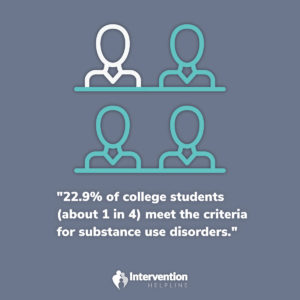For many young adults, college is a time of self-discovery. Moving out of their parent’s home is often the first time in their life where they are not under constant supervision. While this newly discovered freedom offers many benefits, such as fostering self-reliance and self-discipline, it can also lead to out-of-control behavior, addiction and self-destruction.
Here, we’ll share our take on what parents should do when they believe their college-age son or daughter has developed a problem with substance abuse.
College Substance Use Stats
Drug and alcohol abuse is shockingly common among young adults age 18 to 22. In fact, the National Institute on Drug Abuse found in a 2016 survey that 32 percent of college students reported binge drinking (five or more in an evening) within two weeks prior to taking the survey. Furthermore, 12.5 percent of college students reported abusing amphetamine medications such as Adderall and Ritalin in the prior year.
Cocaine use, which had been steadily declining on college campuses over the past decade, is becoming somewhat more prevalent among college students. In 2015, nationwide research showed that 4 to 5 percent of students self-reported using cocaine during their time at university.
Warning Signs of Substance Abuse
Many parents are unaware that their child has begun using drugs or alcohol while in college. Very often, it is not until the son or daughter visits home that a parent notices the changes in their child’s behavior and appearance. While these changes may appear subtle, it is important to remember that addicts will go to great lengths to hide signs of their substance use from loved ones, especially parents.
Here are some common warning signs to look for if you suspect that your son or daughter has developed a substance use disorder in college.
- Poor grades or performance in school
- A seemingly high tolerance to the effects of alcohol
- Signs of financial difficulties, including multiple new credit cards or being evicted
- Sudden weight gain or weight loss
- Disciplinary actions from the school or legal system
- Experiencing withdrawal symptoms while visiting home
- Withdrawing from extracurricular activities in favor of partying
- Frequent boasting about substance-fueled exploits, either in person or through social media
Is Substance Use Just Part of Growing Up?
It is important for parents to recognize the difference between youthful experimentation with forbidden drugs and prolonged periods of substance abuse. While experimenting with drug use and drinking should never be encouraged, a one-off experience with a particular drug or an isolated night of binge drinking may not require the intervention of an addiction treatment professional.
Of course, your response should depend on the particular substance that your college-age child has used. Addiction to methamphetamine, benzodiazepines and opioid drugs can develop rapidly, and the use of such drugs must be addressed swiftly and with all due gravity.
If you fear that your son or daughter is heading down the wrong path while in college, interventions involving trained addiction treatment professionals can be a powerful tool for avoiding future catastrophe.
No One Is Immune to Addiction
While it is important to let young people make their own mistakes as they enter adulthood, drug and alcohol abuse can quickly lead to disaster. Parents simply cannot keep quiet and hope for the best.
When it comes to addiction and substance abuse, it does not matter that your child is smart. It does not matter that you raised them correctly. It does not matter that they know right from wrong. In the end, drugs and alcohol will always win.
Parents frequently struggle to adapt to their changing role in their child’s life. It’s important to realize that although your child may have reached adulthood, you are still his or her parent; there is nothing wrong with doing everything you can to protect your child’s health and well-being. Interventions for college students are often the only way parents can save their children from a life of addiction and misery.
Staging an Intervention for Your Child

College-age children might still be in the “honeymoon” phase of substance abuse, with serious negative consequences appearing abstract and many years away. Young adults might also resist help because they believe that their family’s concerns are rooted in a desire to re-establish control.
Confronting your college-age son or daughter about his or her issues with substance abuse is bound to create at least some level of conflict. If you and your family don’t handle every aspect of the drug and alcohol intervention properly, you run the risk of doing more harm than good. This is why it is so important to seek help from a professional interventionist before taking any major steps.
An experienced interventionist will start out by conducting a meeting with the addicted person’s family. This step helps the interventionist understand the context of the situation from an outsider’s point of view, and allows the family to learn the most effective approach for getting their loved one to accept help.
Keep in mind that many young adults with substance use disorders also suffer from an undiagnosed mental illness. This is why it is important for your interventionist to have experience in conducting mental health interventions in addition to addressing the substance use.
Rehab for College Students
A professional interventionist will also help your family choose a rehabilitation program suited to the needs of the young adult, as college-age individuals often do not thrive in adult-centered addiction treatment programs. By entering a rehabilitation program focused on college students, your child will have the opportunity to share experiences with others who understand the struggles associated with young adulthood.
At Intervention Helpline, our team of professional interventionists understand the unique treatment requirements of college-age individuals and will make sure that your child enters the substance abuse rehabilitation program that is best for him or her.
There Is Help for Your Child
As a parent, it’s only natural to want the best for your son or daughter. But, in the end, it’s up to your child to make the decision to accept help for overcoming the addiction.
If you suspect that your college-age child is abusing drugs or alcohol, call Intervention Helpline today to learn more about how our team of expert interventionists can help.









 All Rights Reserved |
All Rights Reserved |